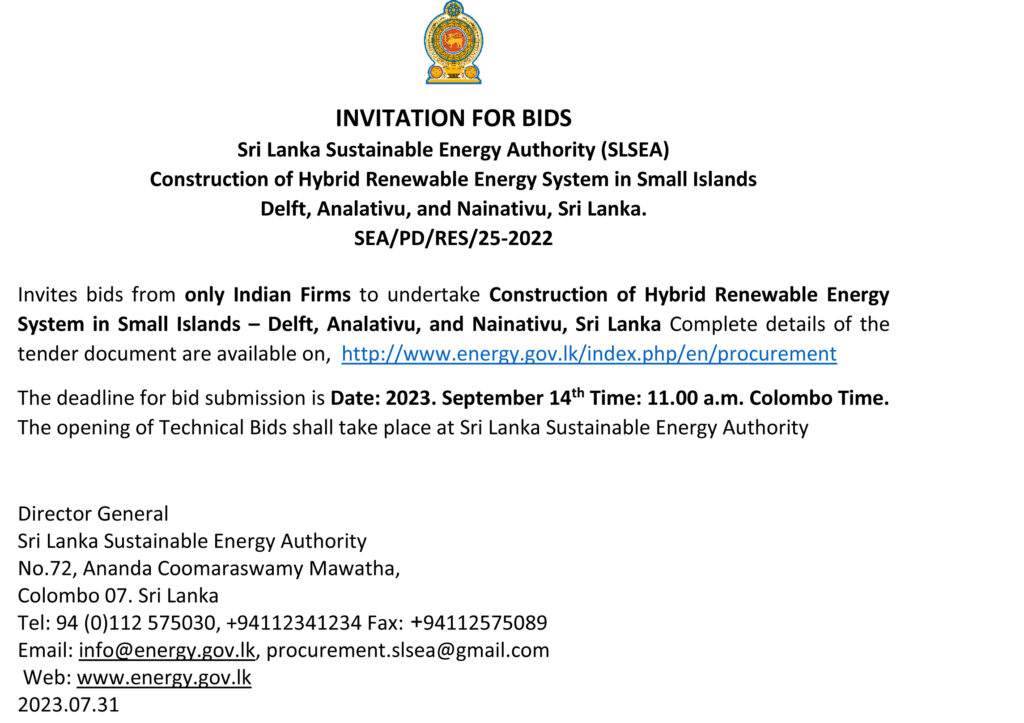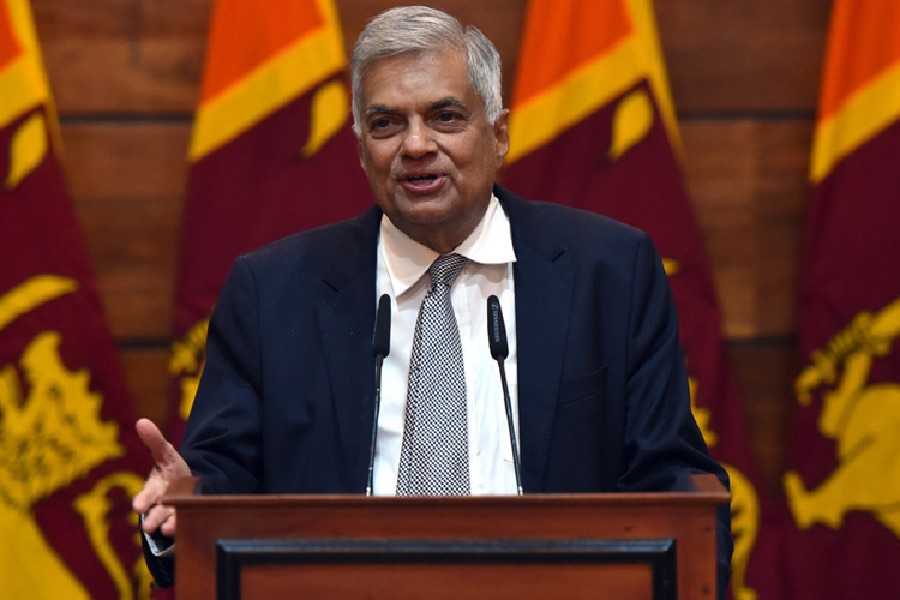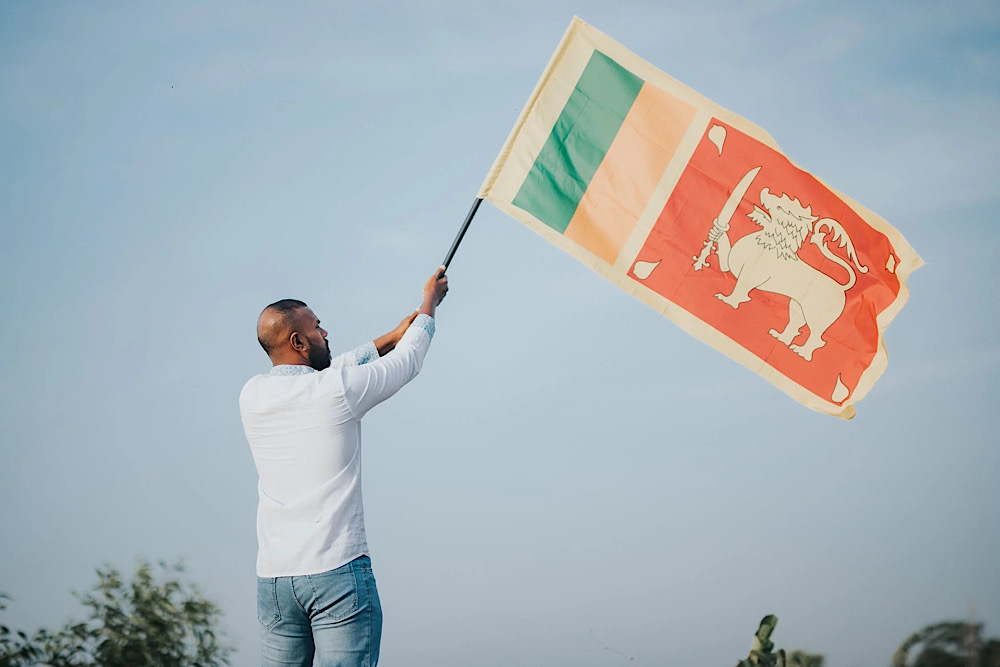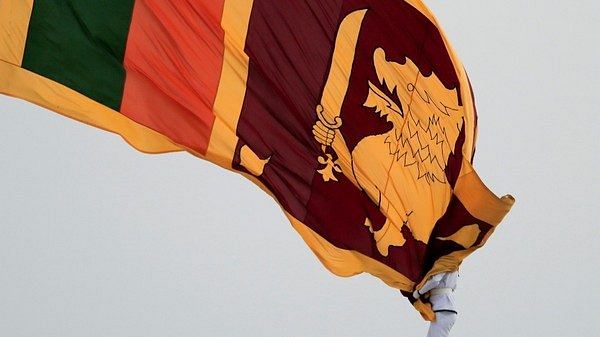Darini Rajasingham-Senanayake
Sri Lanka continues to swing wildly between being a ‘Donor Darling’ flooded with foreign ‘aid’ that has significantly impeded its post-colonial development and industrialization on the one hand, and being a pariah (outcast), on the other.
Last year the country went from being South Asia’s wealthiest nation with the best social and human development indicators to a ‘bankrupt’ beggar, humiliated and shunned by the so-called international community amid a pretentiously named ‘Aragalaya’ protests.
At the time, only South Asia regional hegemon and good neighbor, India, was willing and able to help out Eurobond debt trapped Sri Lanka as the strategic Indian Ocean island staged its first ever Sovereign Default losing Economic Sovereignty and policy autonomy to the Washington Twins and colonial Club de Paris that represents predatory OECD-DAC Eurobond holders,
The narrative in the local and global corporate media echo chamber was that there was no fuel, food, and certainly no tourists to generate exorbitantly privileged and copiously printed US dollars to buy necessities. Famine, fear and 15-hour power-cuts were promised also to promote fear, Brain Drain and institutional debilitation via the local media bereft of investigative journalism after the Aragalaya protest regime change operation saw installation of the US-Force backed Ranil Rajapakse regime.
Simultaneously, last year around this time there was an embargo on ships bringing fuel to the strategic island as the US Marines Sea Vision training program unfolded with coordinated economic hybrid war-style supply chain disruption to make the economy scream” as President Nixon famously had instructed the Central Intelligence Agency (CIA), to do in Cold War Chile, before the violent overthrow of the democratically-elected government of Leftist Salvador Allende and the installation of General Pinochet.[i]
Miraculously this year, Sri Lanka, perpetually in the cross-hairs of Cold War big power rivalry– pumped, dumped and destabilized by various exogenous political-economic shocks to make economy and society scream is back! This after the strategic island too mana from heaven in the form of an International Monetary Fund (IMF) loan to enable magical US dollars to materialize.
No one in Sri Lanka has yet questioned the adequacy of the US Dollar fiat currency to measure the ‘wealth of nations’ given that the US has a debt of $ 32 Trillion and counting and was downgraded by one of its own rating agencies.
Meanwhile the BRICS emerging economies having overtaken the G7 economies and are de-dollarizing fast, while the US backed Ranil Rajapakse regime and opposition turn a blind eye to the New Development Bank.
Indo-Pacific Environmental Security Forum: Another Shangri La Show?
Sri Lanka, which seems to suffer from a Geostrategic Resource Curse, is once again a ‘donor darling’, currently hosting the Indo-Pacific Environmental Security Forum (IPESF) 2023 at Colombo’s Shangri La Hotel that overlooks South Asia’s busiest Port.
One year after a Staged Default and rapid local currency deprecation to beggar the natives, ‘more than 140 senior officers from foreign defense forces and top-level environmentalists from 28 countries in the Indo-Pacific are taking part’ in at the confab at Galle Face.
Two weeks earlier France’s President, Emmanuel Macron had paid a historic midnight visit to Sri Lanka and then on the heels of departing Macron, a Japanese Government team was in town to shower aid on the US Force backed Ranil Rajapakse regime. The Chinese were in Colombo earlier in the month.
One year after staging its first ever Sovereign Default for rapid currency depreciation and mass impoverishment, Sri Lanka is back–a donor darling!
France’s Macron, in retreat from West Africa, where Mali and Niger have cancelled a host of colonial era Agreements, announced plans to set up a brand new Office for the French Agency for International Development (AFD), in Colombo!
AFD in Sri Lanka would enhance France’s claims in the ‘Indo-Atlantic’ or western Indian Ocean, and enable among other things the French Fisheries empire and trawler fleet stationed in the Seychelles to continue neo-colonial looting of Indian Ocean Tuna and other ocean resources.
France claims to be an Indian Ocean country although it is in the Atlantic Ocean, and has claimed extensive Indian Ocean sea bed at UNCLOS while in dispute with Mauritius, while France, Spain, EU and other Distant Water Fishing States (DWFS), have been accused of looting Indian Ocean fisheries at the Indian Ocean Tuna Commission. (See EU accused of Neocolonial plundering of the Indian Ocean in the Guardian). [ii]
Meanwhile local fisheries organizations of impoverished Indian Ocean rim countries have called for a ban on French, EU and other DWFS like Japan, South Korea, EU and Taiwan, Republic of China. These are ironically big Aid donors” to the Fisheries Sector and NARA, while their fisheries corporations are overfishing and causing environmental crisis in the Indian Ocean World region where many littoral countries have high rates of poverty.
A ban on French, EU, Japanese and other DWFS operating in the Indian Ocean under the ‘Free and open Indo-Pacific” theme song would enable the depleted fish stock of the Indian Ocean to recover. It would also enable Sri Lanka and other small countries that engage primarily in ‘artisanal fishery to industrialize and leverage their valuable fisheries resources that are currently looted by DWFS for local consumption, as well as, export to earn much needed foreign currency.
India the regional hegemon would need to lead on this initiative also to ensure food security for the impoverished Indian Ocean littoral countries and islands.
Elephant in the Room: Environmental Impacts of Militarization and War
The 4-day Environmental Security conference in Colombo that commenced this week is happening with the US Indo- Pacific Command (INDOPACOM), Sri Lanka Navy (SLN), and Sri Lanka Coast Guard (SLCG), at a time when human trafficking threats were being talked up. Meanwhile, Moscow is holding an International Security Conference with Chinese Defense minister, Li Shangfu, in attendance.
Lots of nuclear armed warships have been taking trips to strategic Sri Lanka’s ports and the QUAD’s Malabar War games saw the standing and deaths of 100 pilot whales and Dolphins in 2020, the devastating climate impacts of militarization, on-going US-led NATO proxy wars in Europe and Africa, and the war machine are not on the Environmental Security Confab agenda!
In fact, the military business industrial complex and ongoing wars in the world is the elephant in the room of the so-called Environmental Security Forum (IPESF). However, the distracting buzz in Colombo’s corporate media echo chamber that amplifies conflict is that a Chinese Research and Survey Vessel Shi Yan 6, would be reaching Sri Lanka in October for joint research operations with the National Aquatic Research Agency (NARA), in October.
Previously when a Chinese Research Vessel Yuan Wang 4 was in the Colombo port back in 2019, the island was hit by a series of mysterious and deadly ISIS-claimed Easter Sunday attacks on churches and tourist hotels. Four Chinese Research Scientists were killed at Kingsbury Hotel.
As the Shi Yan 6 approaches Sri Lanka in October the Indian Ocean island nation which suffers from a Geostrategic Resource Curse would need to be on high alert for more Mr. Al Bagdadi does not return from the grave to stage another IS terror attack– to make Sri Lankan society and economy scream again!
It not exactly a secret that the Islamic State (IS) was initially set up by the CIA after the US-led invasion of Iraq and the disbanding of Sadaam Hussein’s army, in order to do regime change in Syria and promote a Sunni-Shia divide in the Levant region.
The Indian Ocean as a zone of Peace as Cold War Returns
The environmental impacts of war and militarization appear to be Elephant in the room of the current Environmental Security (IPESF), Shangri La Forum in Colombo, which rather focusses on trendy topics like finance for climate change, Partnerships for climate resilience, Data science in climate risk management, etc.
Indeed, it appears that Mother Nature is being financialized and weaponized with talk of Anthropocene climate crisis, Debt for Nature Swaps (DFNS) based on opaque Carbon credit calculations, while bond scams and Odious debt are green and blue washed like the Diego Garcia Military base on the Chagos Islands that is illegally occupied by the United Kingdom and US.
Ironically, Diego Garcia along with the Chagos Islands have been Blue-washed into a Marine Protection Area (MPA)! Discussions on Environmental, Social and Governance (ESG), Sovereign Bonds for climate transition financing and conservation further distract from the elephant in the room—the Environmental Impacts and costs of war, military bases, and the global Military Business Industrial Complex.
Clearly, Eurobond trapped Sri Lanka that is caught in the US led economic war on the emerging BRICS economies that have overtaken the G-7 at this time. needs to re-affirm the Non-Aligned Movement’s (NAM), declaration of the Indian Ocean as a ‘Zone of Peace’, free of militarization, terror attacks, foreign military bases and nuclear armed submarines and aircraft carriers that beach and kill hundreds of pilot whales and dolphins disoriented by sonar systems.
The war machine and its Carbon and Sonar emissions constitute a far greater clear and present danger to environment and humanity in the region as a new Cold War escalates.
The lead to make the Indian Ocean a ‘Zone of peace” was taken over half a century ago by the world’s first woman Prime Minister. Sri Lanka’s Sirimavo Bandaranaike, and raised it at the Non-Aligned Heads of State Conference in Cairo in October, 1964, and subsequently at the Lusaka Conference of Non-Aligned States in September 1970 and the Singapore Conference of Commonwealth Prime Ministers in January 1971.In 1971 Sri Lanka was successful in having the United Nations General Assembly, by a vote of 61–0 with 55 abstentions, declare the Indian Ocean, together with the air space above it and the ocean floor subjacent thereto, a ‘zone of peace’ for all time.[iii]
A Partitioned Indian Ocean a Zone of War amid Climate Hypocrisy
The Indian Ocean increasingly partitioned into the ‘Indo-Pacific’ to the east and ‘Indo-Atlantic’ on the west, dominated successively by US and France has become a ‘Zone of War’, while its impoverished littoral countries and islands are asset stripped and subject to Ocean Grabbing.
In the context, it is important that Sri Lanka to once again work with India to unify the Indian Ocean world and leverage the legacy of world’s first woman Prime Minister, Sirimavo Bandaranaike, and seek de-militarization and GENUINE PEACE in the Indian Ocean world which should be free of environmentally destructive nuclear weapons. It was arguably also because of this Zone of Peace initiative that the strategic island was later subject to a devastating globally networked 30-year ‘ethnic conflict’. Other NAM leaders and their countries were also subject to devastating social and economic shocks in the course of Cold War regional refractions.
Rather than war and military carbon emissions, spectacular forest fires that increasingly seem to be staged, with stories of drought and floods are the dominant images of Anthropocene climate catastrophe” in the Global Corporate media echo chamber. These images and narratives generally precede advertisements of solar panels, Electric Vehicles, and other lucrative green technology.
Conversely, it is unfashionable to talk about REAL environmental threats and hazards (Anthropocene or otherwise), like the global military business industrial complex, the threat of nuclear war, or the NATO war machine, now seeking to extend into the Indian Ocean and Asia with an office in Tokyo, Japan.
Rather, discussion of carbon credits and Debt for Nature Swaps (DFNS), are trending and avidly marketed at UN Conferences of the Parties (CoP), hot air meets, to benefit predatory Eurobond traders who have ensnared over 50 Global South countries in post Covid-19 lockdown debt traps!
No one wants to embarrass the US government and its EU partners in NATO, or their Asian proxies, intent on promoting the post-Covid-19 Great Reset with Green Technology, Blue Bonds and scams for Global Governance by talking about massive environmental impacts of the Military Business Industrial Complex.
Indeed, talking about non-trivial environmental impacts, such as, wars, bombings, the Nord Stream pipeline attacks that release massive methane gas into the atmosphere is unfashionable, particularly among well-funded climate activists like Greta Thunberg and the gravy train of UNese-speaking, DFNS marketing, environmental NGO ‘protesters’, local and global.
However, long ago departing US President Dwight D. Eisenhower with great prescience warned American citizens about their military business industrial complex in his 1961 farewell address. According the Stockholm Peace Research Institute, the US spends more than the next 7 countries on carbon intense, environmentally destructive militarization, wars and maintaining over 750 military bases around the world. This war machine and culture of war represents the greater environmental threat to the planet and humanity than fossil fuel used in the Global South at this time.
Nevertheless, in the final analysis, Sri Lanka should be grateful that the big powers seem to be talking rather than once again pumping, dumping and de-stabilizing the strategic Indian Ocean island at the Colombo Shangri La Environmental Security show.



